List of presidents of Lebanon facts for kids
The President of Lebanon is the head of state for Lebanon. This important job was created in 1926.
In Lebanon, the president has many important duties and a lot of influence. However, sometimes their role becomes more about representing the country than making big decisions. This can happen because of outside influences or when different political groups agree to work together. Even so, the president helps choose government ministers and makes sure the country's Constitution is followed.
Contents
The National Pact: A Special Agreement
Even though it's not written in the official law, there's an old agreement from 1943 called the National Pact. This agreement says that the president of Lebanon should always be a Maronite Christian. This tradition has been followed in every election since then.
Leaders of Lebanon
State of Greater Lebanon (1926–1943)
| No. | Portrait | Name (Born–Died) |
Time in Office | Political Party | Notes | |||
|---|---|---|---|---|---|---|---|---|
| Started | Ended | Length of Term | ||||||
| 1 | 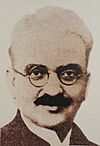 |
Charles Debbas شارل دباس (1884–1935) |
1 September 1926 | 2 January 1934 | 7 years, 123 days | Independent | He was the first President of the Republic of Lebanon. He was elected in 1926 and again in 1929. The French authorities kept him in his role until 1934. During his time, it was decided that Greater Lebanon would not have its own army. He also made the baccalaureate exam (a high school diploma) required for many jobs. | |
| 1926, 1929 | ||||||||
| — | Privat-Antoine Aubouard أنطوان أوبوار (1874–1934) |
2 January 1934 | 30 January 1934 | 28 days | Independent | He was part of the French High Commission, a group that helped govern the area. | ||
| 2 | 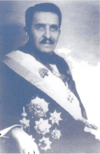 |
Habib Pacha Saad حبيب باشا السعد (1867–1942) |
30 January 1934 | 20 January 1936 | 1 year, 355 days | Independent | Before becoming president, he was the speaker of the Representative Council of Greater Lebanon. | |
| 3 | 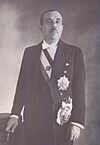 |
Émile Eddé إميل أده (1886–1949) |
20 January 1936 | 4 April 1941 | 5 years, 74 days | National Bloc | Eddé also served as the speaker of the Parliament and as prime minister of Lebanon before becoming president. | |
| 1936 | ||||||||
| — | 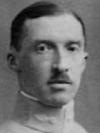 |
Pierre-Georges Arlabosse بيار جورج أرلابوس (1891–1950) |
4 April 1941 | 9 April 1941 | 5 days | Independent | He was a French politician who served as acting President for a few days. | |
| 4 | 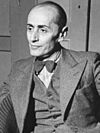 |
Alfred Georges Naccache ألفرد جورج النقاش (1887–1978) |
9 April 1941 | 18 March 1943 | 1 year, 343 days | Kataeb Party | He was also the prime minister of Lebanon in 1941 and later the foreign minister. | |
| — | 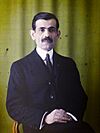 |
Ayoub Tabet أيوب تابت (1884–1951) |
19 March 1943 | 21 July 1943 | 124 days | Independent | He was acting president and also served as Prime Minister during the same time. | |
| 5 | 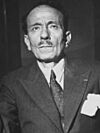 |
Petro Trad بيترو طراد (1876–1947) |
22 July 1943 | 21 September 1943 | 61 days | Independent | Trad was a member of the Lebanese Parliament for many years. He also served as the Speaker of the Parliament. | |
| 6 | 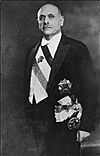 |
Bechara Khoury بشارة الخوري (1890–1964) |
21 September 1943 | 11 November 1943 | 51 days | Constitutional Bloc | He was a strong nationalist who did not like the French rule in Lebanon. He was arrested by French troops in 1943 and held for eleven days. | |
Lebanese Republic (1943–present)
| No. | Portrait | Name (Born–Died) |
Time in Office | Political Party | Notes | |||
|---|---|---|---|---|---|---|---|---|
| Started | Ended | Length of Term | ||||||
| — | 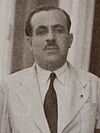 |
Émile Eddé إميل أده (1886–1949) |
11 November 1943 | 22 November 1943 | 11 days | National Bloc | The French authorities put Eddé back in office for a short time. However, other countries involved in World War II pressured France to remove him. Bechara El Khoury was then restored as president. | |
| 1 | 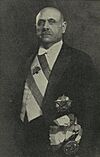 |
Bechara Khoury بشارة الخوري (1890–1964) |
22 November 1943 | 18 September 1952 | 8 years, 301 days | Constitutional Bloc | He was released from prison and became president again. He replaced Émile Eddé during World War II. | |
| 1943, 1948 | ||||||||
| — | 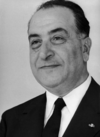 |
Fouad Chehab فؤاد شهاب (1902–1973) |
18 September 1952 | 22 September 1952 | 4 days | Military | Chehab was a military leader. He refused to let the army get involved in the protests that made President Bechara El Khoury resign. Chehab then became acting president to make sure a new election could happen. | |
| 2 | 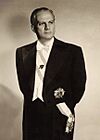 |
Camille Chamoun كميل شمعون (1900–1987) |
23 September 1952 | 22 September 1958 | 5 years, 364 days | Constitutional Bloc | Towards the end of his term, some groups tried to overthrow his government. This led to clashes in 1958, known as the 1958 Lebanon crisis. | |
| National Liberal Party | ||||||||
| 1952 | ||||||||
| 3 | 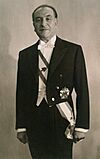 |
Fouad Chehab فؤاد شهاب (1902–1973) |
23 September 1958 | 22 September 1964 | 5 years, 365 days | Independent | He helped calm tensions and bring stability back to Lebanon by working with different religious groups and political forces. His ideas influenced later presidents. | |
| 1958 | ||||||||
| 4 | 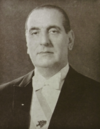 |
Charles Helou شارل حلو (1913–2001) |
23 September 1964 | 22 September 1970 | 5 years, 364 days | Chehabist | The Six-Day War in 1967 caused problems between different groups in Lebanon. Helou tried to keep Lebanon out of the conflict. However, tensions grew, and the country became more divided. | |
| 1964 | ||||||||
| 5 | 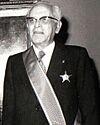 |
Suleiman Frangieh سليمان فرنجية (1910–1992) |
23 September 1970 | 22 September 1976 | 5 years, 365 days | Marada Movement | He was elected president in a very close and debated election. The Lebanese Civil War began during his fifth year in office. | |
| 1970 | ||||||||
| 6 | 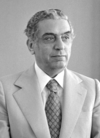 |
Élias Sarkis إلياس سركيس (1924–1985) |
23 September 1976 | 22 September 1982 | 5 years, 364 days | Chehabist | People hoped Sarkis could unite the fighting groups and end the civil war. However, the situation became very difficult as Syria and other countries started to get involved. | |
| 1976 | ||||||||
| 7 | 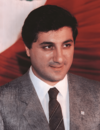 |
Bachir Gemayel بشير الجميل (1947–1982) |
23 August 1982 | 14 September 1982 | 22 days | Kataeb Party | He was elected during the height of the Lebanese Civil War. Sadly, he was assassinated in an explosion before he could officially start his term as president. | |
| 1982 | ||||||||
| 8 | 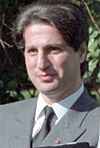 |
Amine Gemayel أمين الجميل (born 1942) |
23 September 1982 | 22 September 1988 | 5 years, 365 days | Kataeb Party | When he became president, foreign armies occupied much of Lebanon. His government had little power. He worked to rebuild the Lebanese Army. He also tried to make a peace agreement with Israel. | |
| 1982 | ||||||||
| — | 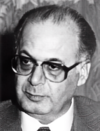 |
Selim Hoss سليم الحص (born 1929) |
22 September 1988 | 5 November 1989 | 1 year, 44 days | Independent | When the previous president's term ended, two different people claimed to be in charge of the government. Hoss led one of these governments. | |
| — | 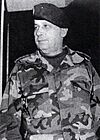 |
Michel Aoun ميشال عون (born 1933) |
22 September 1988 | 13 October 1990 | 2 years, 21 days | Military | The outgoing president appointed Aoun as Prime Minister, leading a military government. This led to two different governments trying to rule Lebanon at the same time. | |
| 9 | 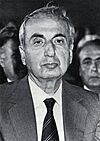 |
René Moawad رينيه معوض (1925–1989) |
5 November 1989 | 22 November 1989 | 17 days | Independence Movement | He had served as a minister in various roles before becoming president. His presidency was very short. Just seventeen days after being elected, he was killed by a car bomb. | |
| 1989 | ||||||||
| Vacant from 22 November 1989 until 24 November 1989 | ||||||||
| 10 | 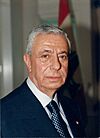 |
Elias Hrawi إلياس الهراوي (1926–2006) |
24 November 1989 | 24 November 1998 | 9 years | Independent | Hrawi was elected president two days after René Moawad was killed. He oversaw the end of the Lebanese Civil War. He signed a treaty with Syria, promising that Lebanon would not be used against Syria's interests. | |
| 1989 | ||||||||
| 11 | 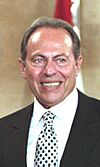 |
Émile Lahoud إميل لحود (born 1936) |
24 November 1998 | 24 November 2007 | 9 years | Independent | Lahoud became president after the constitution was changed to allow the army commander to run for office. He worked closely with Hezbollah. He tried to have more control over government decisions. | |
| 1998 | ||||||||
| Vacant from 24 November 2007 until 25 May 2008 | ||||||||
| 12 | 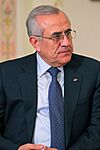 |
Michel Suleiman ميشال سليمان (born 1948) |
25 May 2008 | 25 May 2014 | 6 years | Independent | Suleiman was the commander of the Lebanese Armed Forces before becoming president. He was chosen because political parties in Lebanon were very divided. He started national talks to help bring the country together. | |
| 2008 | ||||||||
| Vacant from 25 May 2014 until 31 October 2016 | ||||||||
| 13 | 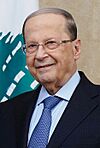 |
Michel Aoun ميشال عون (born 1933) |
31 October 2016 | 31 October 2022 | 6 years | Free Patriotic Movement | Aoun was also a commander of the Lebanese Armed Forces. The presidency was empty for almost two and a half years before he was finally elected. This happened after an agreement between two major political groups. | |
| 2014–2016 | ||||||||
| Vacant since 31 October 2022 | ||||||||
Timeline of Presidents

See also
 In Spanish: Anexo:Presidentes del Líbano para niños
In Spanish: Anexo:Presidentes del Líbano para niños
- List of prime ministers of Lebanon
- List of speakers of the Parliament of Lebanon
- President of Lebanon
- Prime Minister of Lebanon
- High Commissioner of the Levant

